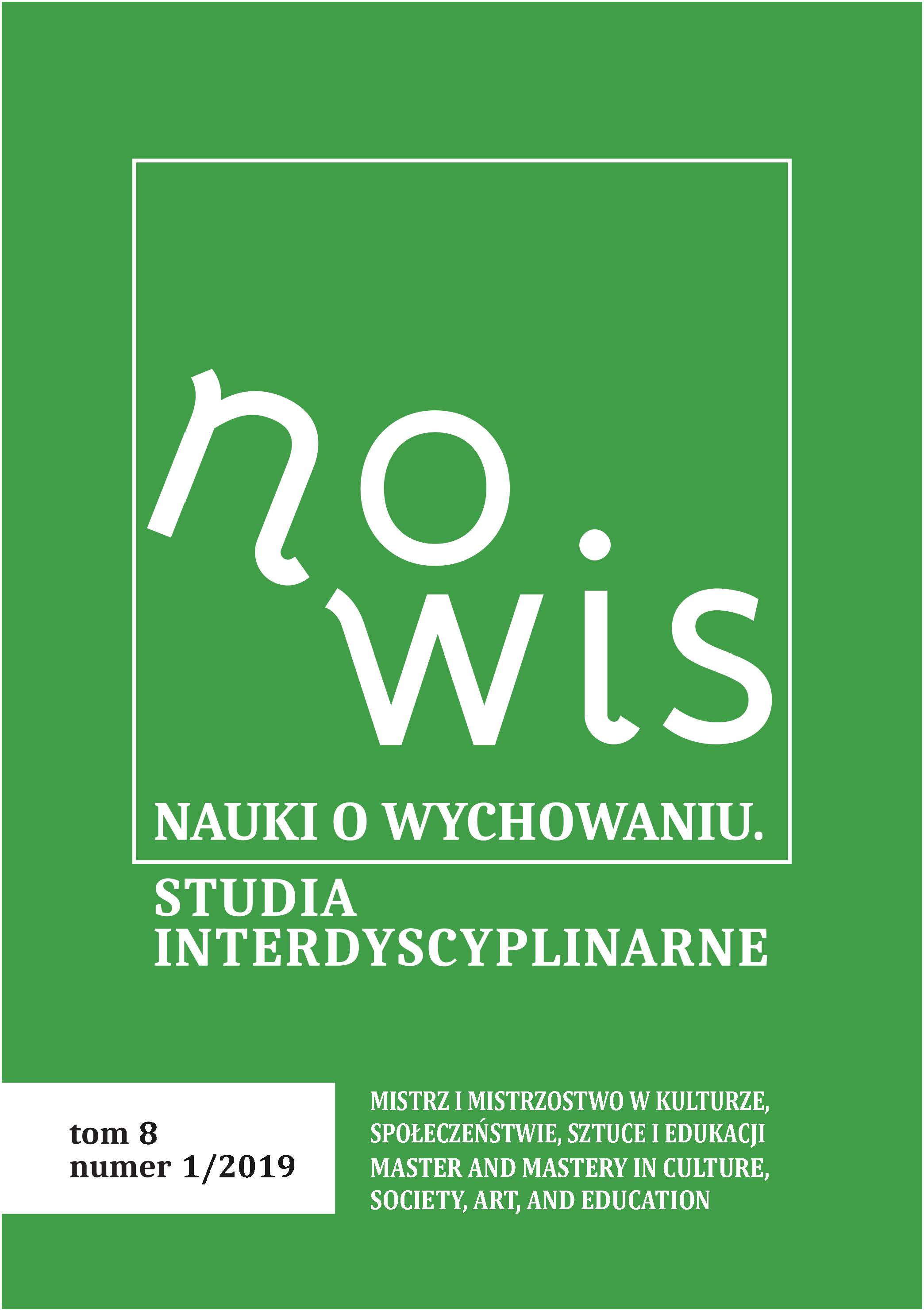The Master as a Historical, Cultural and Pedagogical Category: An Introduction
DOI :
https://doi.org/10.18778/2450-4491.08.05Mots-clés :
master, master-disciple relationship, semantic categories, cultural contextRésumé
The Master is a semantic category which exists in every culture and in every historical moment in the world. The tasks and the role of the master in society are changing, but nevertheless, masters continue to support the development of science, art, education or moral systems. There are many different contexts for this category that reveal specific aspects of being the master, as well as the value of the relation between a master and a student. The aim of this text is to characterize them and take readers on a literary and scientific journey through different cultures, past centuries, and social institutions that will help us to better understand the phenomenon of the master(s).
Références
Bauman Z. (2006) Płynna nowoczesność [Liquid Modernity], transl. by T. Kunz, Kraków, Wydawnictwo Literackie.
View in Google Scholar
Bauman Z. (2007) Płynne czasy: życie w epoce niepewności [Liquid Times: Living in an Age of Uncertainty], transl. by M. Żakowski, Warszawa, Wydawnictwo Sic!
View in Google Scholar
Beck U. (2012) Społeczeństwo światowego ryzyka: w poszukiwaniu utraconego bezpieczeństwa [Weltrisikogesellschaft: Auf der Suche nach der verlorenen Sicherheit], transl. by B. Baran, Warszawa, Wydawnictwo Naukowe Scholar.
View in Google Scholar
Chałasiński J. (1928) Wychowanie w domu obcym jako instytucja społeczna: studjum z socjologii wychowania, Poznań, Fiszer i Majewski: PIS.
View in Google Scholar
Coelho P. (1995) Alchemik [O Alquimista], transl. by B. Stępień, A. Kowalski, Warszawa, Drzewo Babel.
View in Google Scholar
Fukuyama F. (1996) Koniec historii [The End of History and the Last Man], transl. by T. Bieroń, M. Wichrowski, Poznań, Zysk i S-ka.
View in Google Scholar
Goćkowski J., Siemanowski A. (Eds.) (1981) Szkoły w nauce: praca zbiorowa, Wrocław, Zakład Narodowy im. Ossolińskich.
View in Google Scholar
Goleman D. (1997) Inteligencja emocjonalna [Emotional Intelligence: Why It Can Matter More Than IQ], transl. by A. Jankowski, Poznań, Wydawnictwo Media Rodzina.
View in Google Scholar
Havelock E. A. (2007) Przedmowa do Platona, transl. by P. Majewski, Warszawa, Wydawnictwo Uniwersytetu Warszawskiego.
View in Google Scholar
Husserl E. (1975) Idee czystej fenomenologii i fenomenologicznej filozofii, transl. by D. Gierulanka, R. Ingarden, Warszawa, Państwowe Wydawnictwo Naukowe.
View in Google Scholar
Husserl E. (1982) Medytacje kartezjańskie, transl. by A. Wajs, Warszawa, Państwowe Wydawnictwo Naukowe.
View in Google Scholar
Jakubczak K. (2001) Filozoficzne szkoły buddyzmu mahajany – madhjamaka i jogaczara in: Filozofia Wschodu, B. Szymańska (Ed.), Kraków, Wydawnictwo Uniwersytetu Jagiellońskiego: 207–244.
View in Google Scholar
Khân G. M. (2003) Budda oświecony [Buddha L’illuminato], transl. by H. Borkowska, Warszawa, Muza.
View in Google Scholar
Kosior K. (2001a) Buddyzm pierwotny in: Filozofia Wschodu, B. Szymańska (Ed.), Kraków, Wydawnictwo Uniwersytetu Jagiellońskiego: 181–196.
View in Google Scholar
Kosior K. (2001b) Wczesne szkoły buddyjskie. Abhiddharma in: Filozofia Wschodu, B. Szymańska (Ed.), Kraków, Wydawnictwo Uniwersytetu Jagiellońskiego: 197–206.
View in Google Scholar
Kot S. (1996) Historia wychowania, vol. 1, Od starożytnej Grecji do połowy wieku XVIII, Warszawa, Wydawnictwo Akademickie „Żak”.
View in Google Scholar
Latour B. (2010) Splatając na nowo to, co społeczne: wprowadzenie do teorii aktora-sieci [Reassembling the Social. An Introduction to actor-Network Theory], transl. by A. Derra, K. Abriszewski, Kraków, Universitas.
View in Google Scholar
Marynowicz-Hetka E. (Ed.) (1997) Mistrz – uczeń. Wyobrażenia czy rzeczywistość, czyli o tworzeniu szkół naukowych, Łódź, Łódzkie Towarzystwo Naukowe.
View in Google Scholar
McLuhan M. (2001) Wybór tekstów, transl. by E. Różalska, J. M. Stokłosa, Poznań, Zysk i S-ka.
View in Google Scholar
Mead M. (1978) Kultura i tożsamość: studium dystansu międzypokoleniowego [Culture and Commitment: A Study of the Generation Gap], transl. by J. Hołówka, Warszawa, Państwowe Wydawnictwo Naukowe.
View in Google Scholar
Nakamura H. (2005) Systemy myślenia ludów Wschodu. Indie, Chiny, Tybet, Japonia [Ways of Thinking of Eastern People: India-China-Tibet-Japan], P. P. Wiener (Eds.), transl. by M. Kanert, W. Szkudlarczyk-Brkić, Kraków: Wydawnictwo Uniwersytetu Jagiellońskiego.
View in Google Scholar
Plato (2002) Fedon [Phaedo], transl. by W. Witwicki, Kęty, Wydawnictwo Antyk.
View in Google Scholar
Reale G. (2001) Historia filozofii starożytnej [A History of Ancient Philosophy II. Plato and Aristotle], vol. 2, Platon i Arystoteles, transl. by E. I. Zieliński, Lublin, Redakcja Wydawnictw Katolickiego Uniwersytetu Lubelskiego.
View in Google Scholar
Rybicki P., Goćkowski J. (Eds.) (1980) Autorytet w nauce: praca zbiorowa, Wrocław, Zakład Narodowy im. Ossolińskich.
View in Google Scholar
Saussy H. (2006) Exquisite Cadavers Stitched from Fresh Nightmares: Of Memes, Hives, and Selfish Genes in: Comparative Literature in an Age of Globalization, H. Saussy (Ed.), Baltimore, The John Hopkins University Press: 3–24.
View in Google Scholar
Stróżewski W. (2007) Promieniowanie mistrza, „W drodze”, 2 (402), http://www.wdrodze.pl/miesiecznik/index.php?mod=archiwumtekst&id=12327#.W6k36fZpzIU [accessed: 20.09.2018].
View in Google Scholar
Szymańska B. (Ed.) (2001) Filozofia Wschodu, Kraków, Wydawnictwo Uniwersytetu Jagiellońskiego.
View in Google Scholar
Tatarkiewicz W. (1998) Historia filozofii, vol. 1, Filozofia starożytna i średniowieczna, Warszawa, Wydawnictwo Naukowe PWN.
View in Google Scholar
Weber M. (2011) Racjonalność, władza, odczarowanie, transl. by M. Holona, A. Kopacki, Poznań, Wydawnictwo Poznańskie.
View in Google Scholar
Witkowski L. (2007/2016) Między pedagogiką, filozofią i kulturą. Studia, eseje, szkice, Warszawa, Instytut Badań Edukacyjnych.
View in Google Scholar
Witkowski L. (2011) Historie autorytetu wobec kultury i edukacji, Kraków, Oficyna Wydawnicza Impuls.
View in Google Scholar
Znaniecki F. (1928) Socjologja wychowania, vol. 1, Wychowujące społeczeństwo, Warszawa, Skł. gł. Książnica–Atlas.
View in Google Scholar
Znaniecki F. (1930) Socjologja wychowania, vol. 2, Urabianie osoby wychowanka, Warszawa–Lwów, Nakł. Naukowego Towarzystwa Pedagogicznego, skł. gł. Książnica– Atlas.
View in Google Scholar
Znaniecki F. (1984) Społeczne role uczonych, transl. by J. Szacki, Warszawa, Państwowe Wydawnictwo Naukowe.
View in Google Scholar
http://ci.edu.pl/ [accessed: 20.09.2018].
View in Google Scholar
http://fundusz.org/ [accessed: 20.09.2018].
View in Google Scholar
http://www.aal.edu.pl/ [accessed: 20.09.2018].
View in Google Scholar
Téléchargements
Publiée
Comment citer
Numéro
Rubrique
Licence

Ce travail est disponible sous licence Creative Commons Attribution - Pas d'Utilisation Commerciale - Pas de Modification 4.0 International.





 Le site web de la revue, hébergé par l'équipe éditoriale de NOWIS se trouve sur la plate-forme Index Copernicus:
Le site web de la revue, hébergé par l'équipe éditoriale de NOWIS se trouve sur la plate-forme Index Copernicus: 





